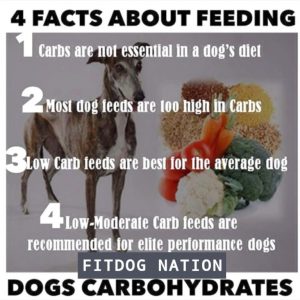
High quality nutrition is paramount to a healthy fit dog, especially one that works. The carbohydrate debate is a controversial one in the performance dog arena. Therefore we decided to do some research and present some facts.
FACT 1:
According to the National Research Council and compared to the other two major nutrients — protein and fat — no carbs are considered essential for a healthy canine diet. Dogs don’t need corn, wheat, barley rice or potatoes, either. Yet surprisingly, carbs represent the dominant nutrient found in most dry dog foods.
FACT 2:
Most dog feeds are too high in carbs: Carbohydrates are used in abundance in most dog feeds for many reasons, but primarily they are included because they are a relatively inexpensive source of energy and can help to keep the price of dog food more affordable. Carbs are not inherently bad, but they should make up 1/3 or less of the daily calories for most normally healthy pets.
FACT 3:
Low carb feed is recommended for the average dog. Carbohydrates aren’t bad for dogs; in reasonable amounts, they can actually provide a practical source of energy. However, the issue lies in their quantity. Using a dogs ancestral diet as a model, the total amount of carbs consumed by a dog’s evolutionary predecessor is significantly less than what’s become the norm for today’s kibbles. One sensible source estimates natural carbohydrate consumption for a dog’s ancestors at around 14 percent of their total diet. Yet on average, today’s dry dog foods contain somewhere between 46 and 74 percent carbohydrate!
FACT 4:
A low to moderate carb feed is recommended for elite performance dogs such as greyhounds. Dr Ben Holding a greyhound nutrition adviser recommends a 25% Protein / 40% Fats / 35% carbohydrate based diet for elite performance dogs such as greyhounds.
What’s your take on Carbohydrates?
REFERENCES:
1) Lindblad-Toh K, Wade CM, Mikkelsen TS, et al, “Genome sequence, comparative analysis and haplotype structure of the domestic dog”, December 2005, Nature 438 (7069): 803–19
2) Brown S., Taylor B., “See Spot Live Longer”, 2007 Creekobear Press, Eugene, OR USA, pp 51-61
National Research Council, National Academy of Science, “Nutrient Requirements of Dogs and Cats”, 2006 Edition, National Academies Press, Washington, DC, p 317
Keep them FIT,
FITDOGNATION.